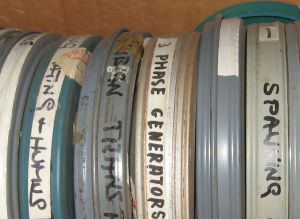Finding the Moment: The films of Eric Lucey and the Research Film Unit of the Institute of Animal Genetics
Historical Context
In 1950 Eric C. A. Lucey (1923-2010) suggested to Professor Waddington that a Research Film Unit be established within the Institute for Animal Genetics. His request was granted by an enthusiastic Waddington and Lucey was able to follow the recommendations of a number of contemporary reports that were calling for an increased use of film in research and teaching. The Unit remained a one man operation until Lucey’s early retirement in 1989.
His extensive collection of films include those about or featuring leading medics and scientists such as Conrad Hal Waddington, Dorian Pritchard, Christopher Pennington and Charlotte Auerbach as well as films focusing on specific teaching and research issues (e.g. 'Amphibian Dissection' or 'Optomotor Responses in Cephalotods'). Alongside these sit a smaller number of films of a slightly more general nature, somewhat contextualising Lucey’s work and the broader landscape in which the Institute of Animal Genetics operated. Some of Lucey’s films won international awards, such as Shoreline Sediments which attained first prize in the Geography/Geology section of the Fifth International Festival of Technical and Scientific Films in 1970.
The Project
Funded by the Wellcome Trust, this was a two-month scoping project, identifying content, identifying (and disposing of) duplicates and other erroneous material, tackling urgent preservation issues and creating a robust framework to allow this significant collection to be properly catalogued and digitised (as appropriate) in a future project. The collection consists predominantly of various gauges of open-reel films and accompanying audio tape (with smaller quantities of video cassettes and folders of photographs and papers).

Due to the format of the items in this collection, it was necessary to work with specialists and specialist equipment in order to meet the preservation needs of this material while content was identified and appraised. As such, a relationship has been developed with Scottish Screen Archive (part of the National Library of Scotland), which facilitated and supported the project.
A rudimentary list of film titles, content and approximate running times was created to serve as an interim finding aid. A preservation assessment was used to prioritise repackaging, based on need, within the available budget and to further work that is required was identified.
By the end of the project, the most pressing preservation needs were addressed and enough information gathered to identify its main content. This now facilitates a more detailed analysis of the collection and its potential for digitisation.
The project ran for two months from late August 2011.

